Last Friday, we were all invited to call into a company-wide townhall meeting from our desks. Our CEO, Armen Adjemian, announced that as of the coming Monday (3/16), DISQO would be enforcing a mandatory work from home policy to do our part and help curb the spread of COVID-19. We were ready.
Since the beginning of DISQO, our CTO Drew Kutcharian has built our team to enable a fully remote workforce. His foresight has enabled us to transition with minimal hiccups. And on day one of our work from home tenure, he provided us with a list of protocols and outlooks, which I will share in this article.
Drew says, “Fortunately, we have set a lot of groundwork in the last 6 months to enable productive remote work with our “Data-Driven Management” initiative. So we have been preparing for this, but we’ve never worked 100% remotely as a team.” We’re a powerful team, so we’re seeing this as the ultimate opportunity to grow as individuals and as a company by supporting one another.
Adapt to the New Work Mentality
We are dealing with an unusual situation, so adapting to a new work mentality is paramount. DISQO is using this time as an opportunity to become a stronger team. Those of us who work in one of our offices in the U.S. and Armenia are used to getting up and walking over when we need to speak with someone.
In our offices, there is near-constant chatter among our team members as we work collaboratively. We have a very open culture of general helpfulness and attentiveness towards one another. This applies to our remote workers too, whom we communicate with heavily via Slack, email, JIRA, and Google Hangouts.
However, since we are all working from home now, we have had to shift from our in-office “speak first” default to “write first”. We are also committed to over-communication. This new work mentality encourages us to be more thoughtful and thorough about the way that we communicate, which will enable us to grow closer as a team as well as encourage interpersonal trust.
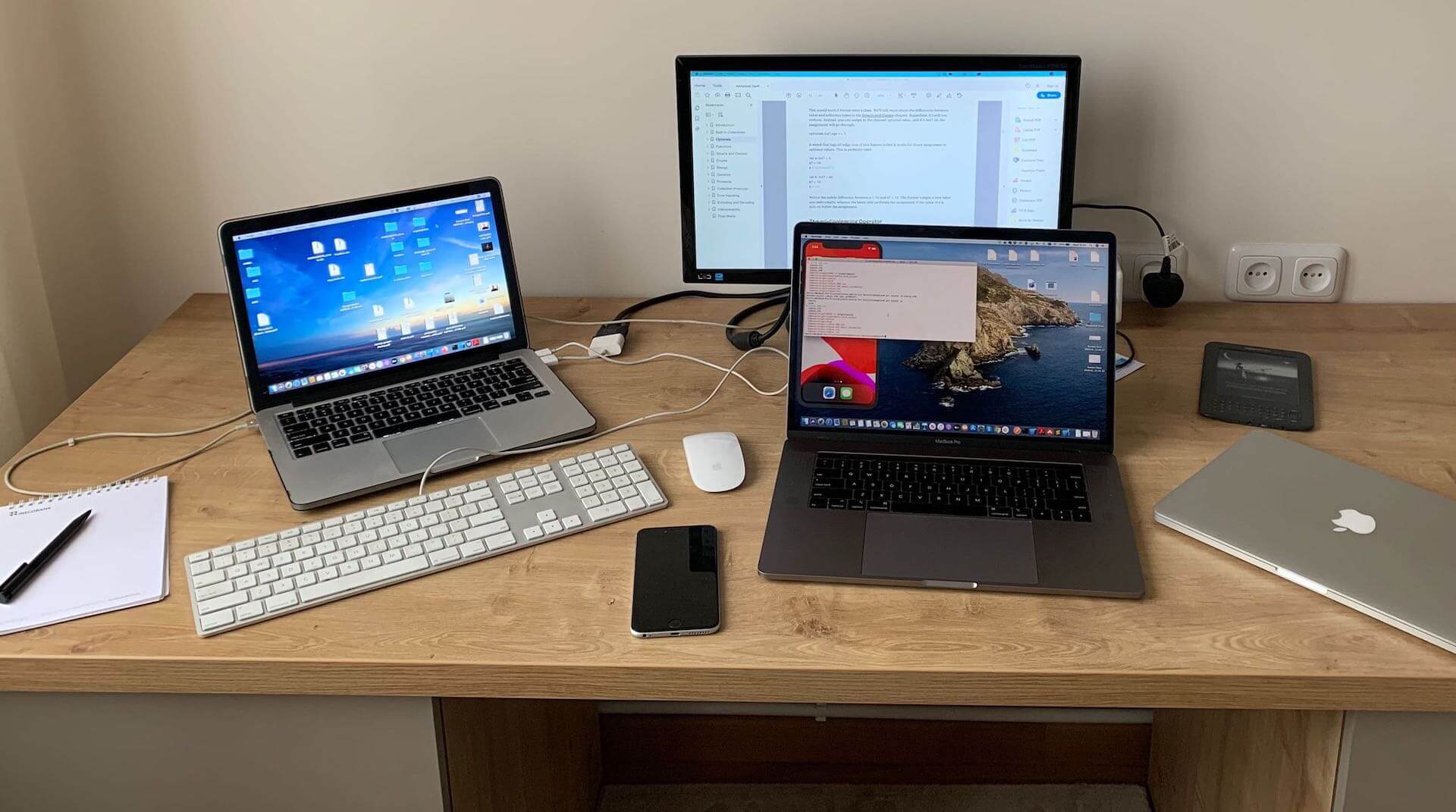
Senior Software Engineer Davit’s home setup includes three laptops and a Kindle.
Manage Direct Communication
At DISQO, we use Slack for our day-to-day short-form communication. Drew emphasizes the importance of keeping a stricter watch on our incoming Slack messages and our availability. Slack enables us to set a status, which appears as an icon next to our names. When someone hovers over the icon, they’ll see a brief message explaining the status further.
Some example statuses are “I’m working and I’m open for collaboration”, “I’m working but I need quiet time to focus”, “I’m not actively working but I’m available to respond to urgent messages”, and “I’m unavailable.” These are clear indicators to our colleagues about our current overall state and our capacity to take requests.
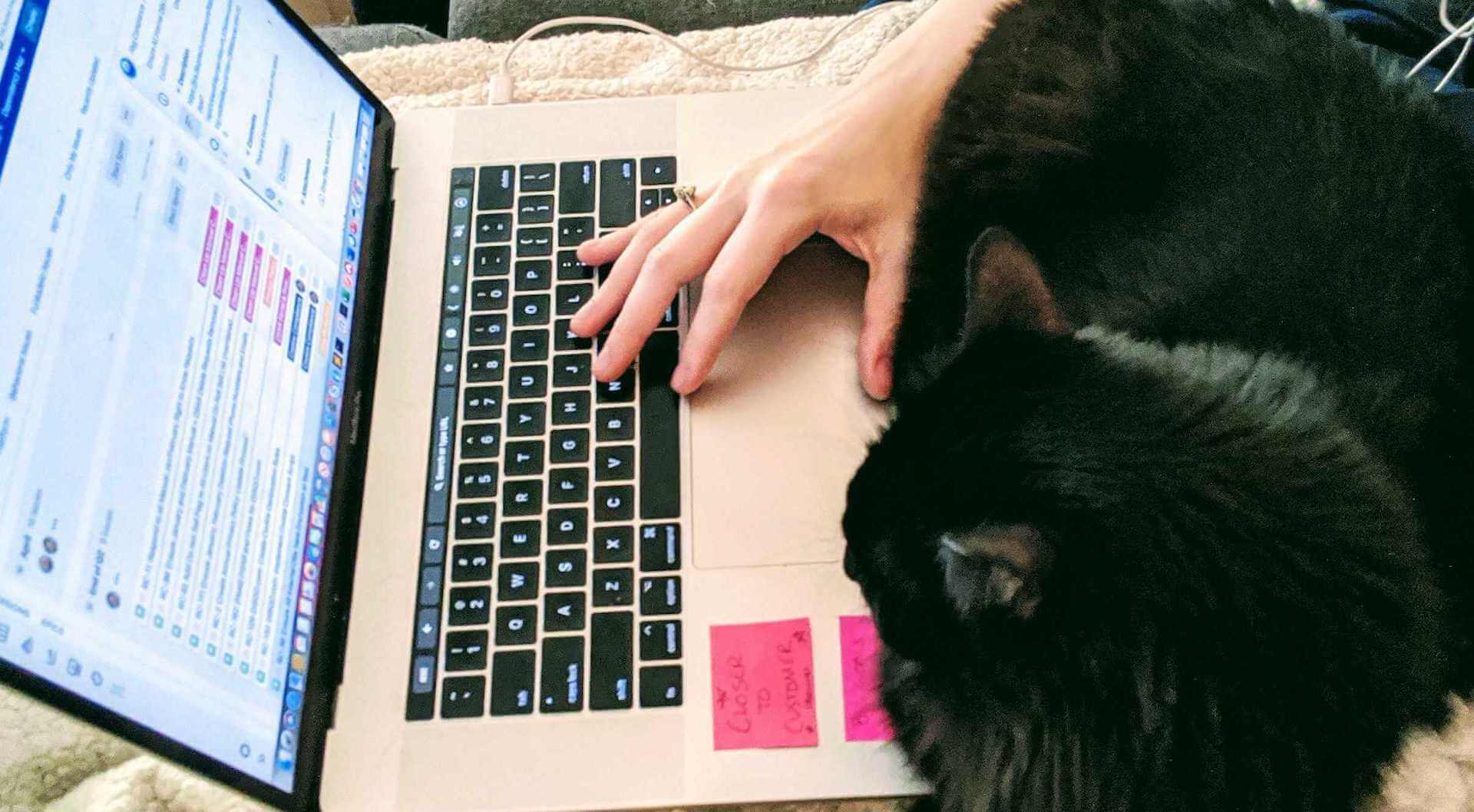
Senior Product Manager Anne is waiting on the new desk and chair DISQO ordered to get her fully set up. In the meantime, Zahara insists on reading over all of Anne’s work.
Determine the Urgency of Incoming Messages
Since we are focusing heavily on over-communication, this is also a time for us to evaluate and practice self-discipline. As Drew puts it, “Not all Slack messages and emails need to be responded to immediately.” It is in our best interest to view our incoming messages and make our own determination as to the level of urgency a particular message holds.
Drew tells us to refer to the Eisenhower Matrix if we are learning to evaluate urgency or need a refresher. During this time, it’s also important to be able to say “no” to some requests. And our “no”s should be accompanied by a reasonable explanation as to why we cannot allocate time to the request.
DISQO recently rolled out OKRs (Objectives and Key Results). OKRs enable us to focus on the company’s ultimate goals and what each manager and individual contributor can do to achieve them. With this new system in place, we’re able to better determine if the requests directed our way work towards the OKRs we’ve set. Anything that does not contribute to the achievement of our Objectives is viewed as secondary, and is treated as such.
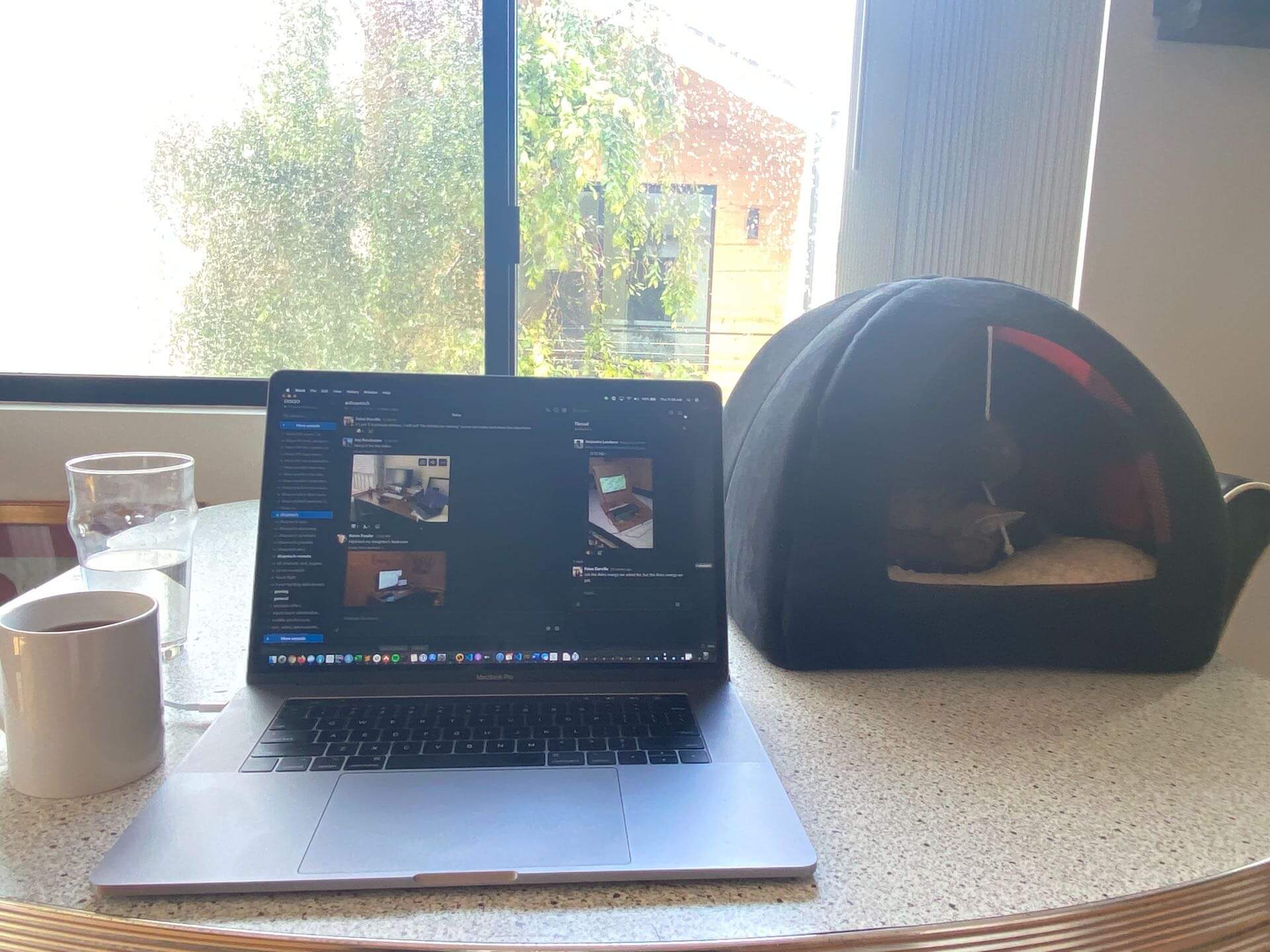
Senior Data Analyst Armand’s home setup includes a cat bed for Milo and a great view.
Schedule Time to Connect
While working from home, it can be easy to get wrapped up in our tasks. At DISQO, managers are pretty strict on having frequent one-on-ones, which are meetings between individual contributors and their manager. During this time, individual contributors talk about items blocking their work and whether or not there’s something their manager can help them with. Anything goes during these conversations.
Now is especially the time for us to ensure that we have our one-on-ones on the calendar, and Drew suggests individual contributors meet with their managers at least bi-weekly. Along these lines, he also reminds us to keep a close watch on our calendars and emails so we don’t miss any scheduled meetings.
Additionally, it’s important that we don’t lose the human element of meetings. As a general rule, we are keeping our cameras on during meetings when possible. Drew says “Studies have shown that it makes a big difference in making stronger social connections since it helps us to maintain empathy in the absence of in-person cues.”
Just as important as it is to schedule times to connect, it’s also equally important to employ healthy working hours. Being home and bored, we may default to working a lot more (which can eventually cause burnout) or making ourselves overly available. To avoid this, we’re all encouraged to use Google Calendar working hours.
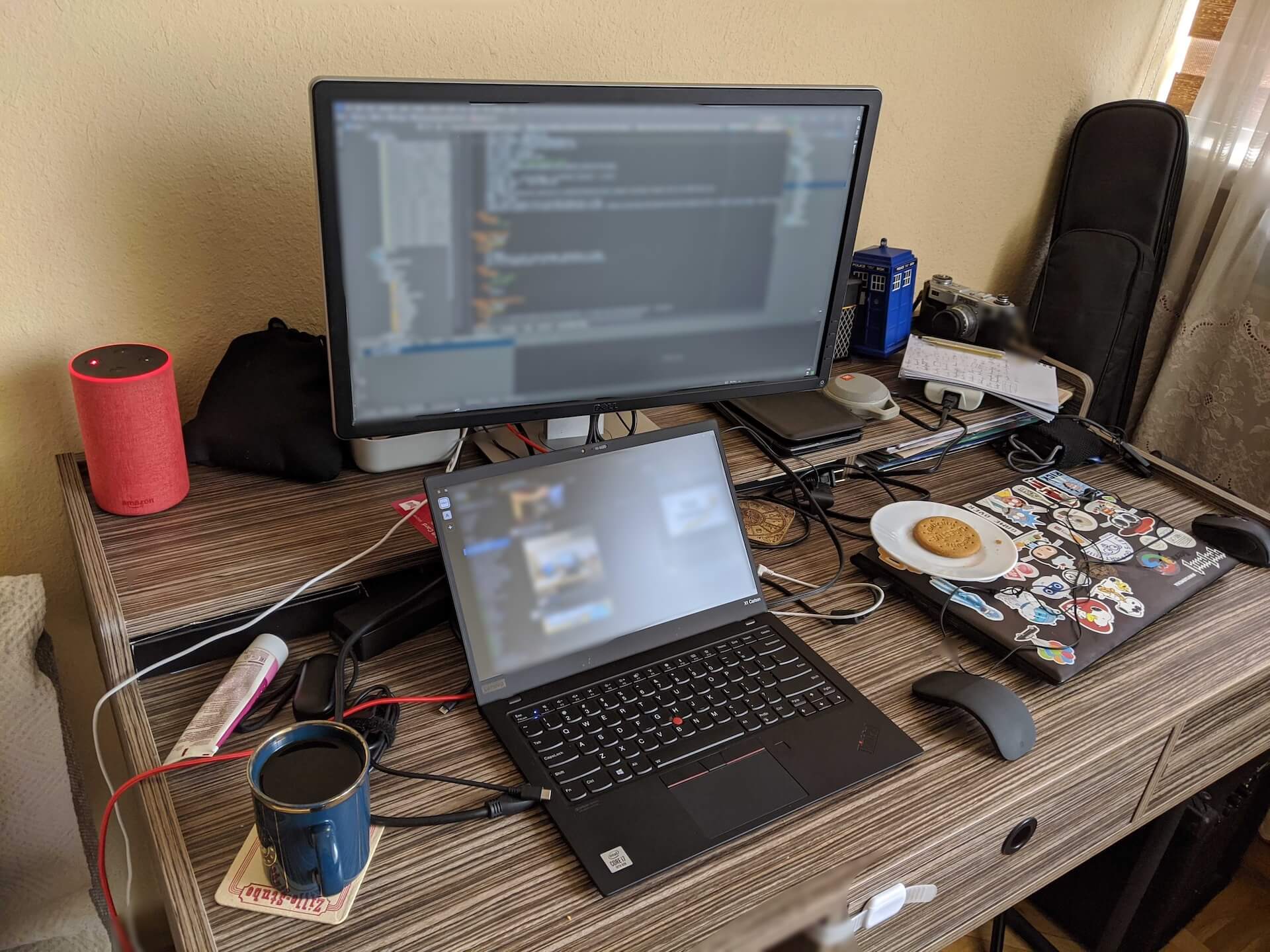
Lead Data Engineer Gor’s home setup features a drink, a snack, and a Tardis for quick time travel during his lunch break.
Continue Socializing
Going from working in a social startup environment to working from home is a sudden change. But we are doing everything we can to retain our sense of community and our overall culture. To continue breathing life into our culture, we’re encouraged to schedule non-work related Google Hangouts with our colleagues.
We’ve already had multiple hangout times so far: St. Patrick’s Day beer time, “coffee chat” with people we normally walk to the local coffee shop with, and a “neighbor chat” in which we invited our desk neighbors and checked in to see how everyone is coping. Some of the gamers in the office are also using online multi-player games to connect.
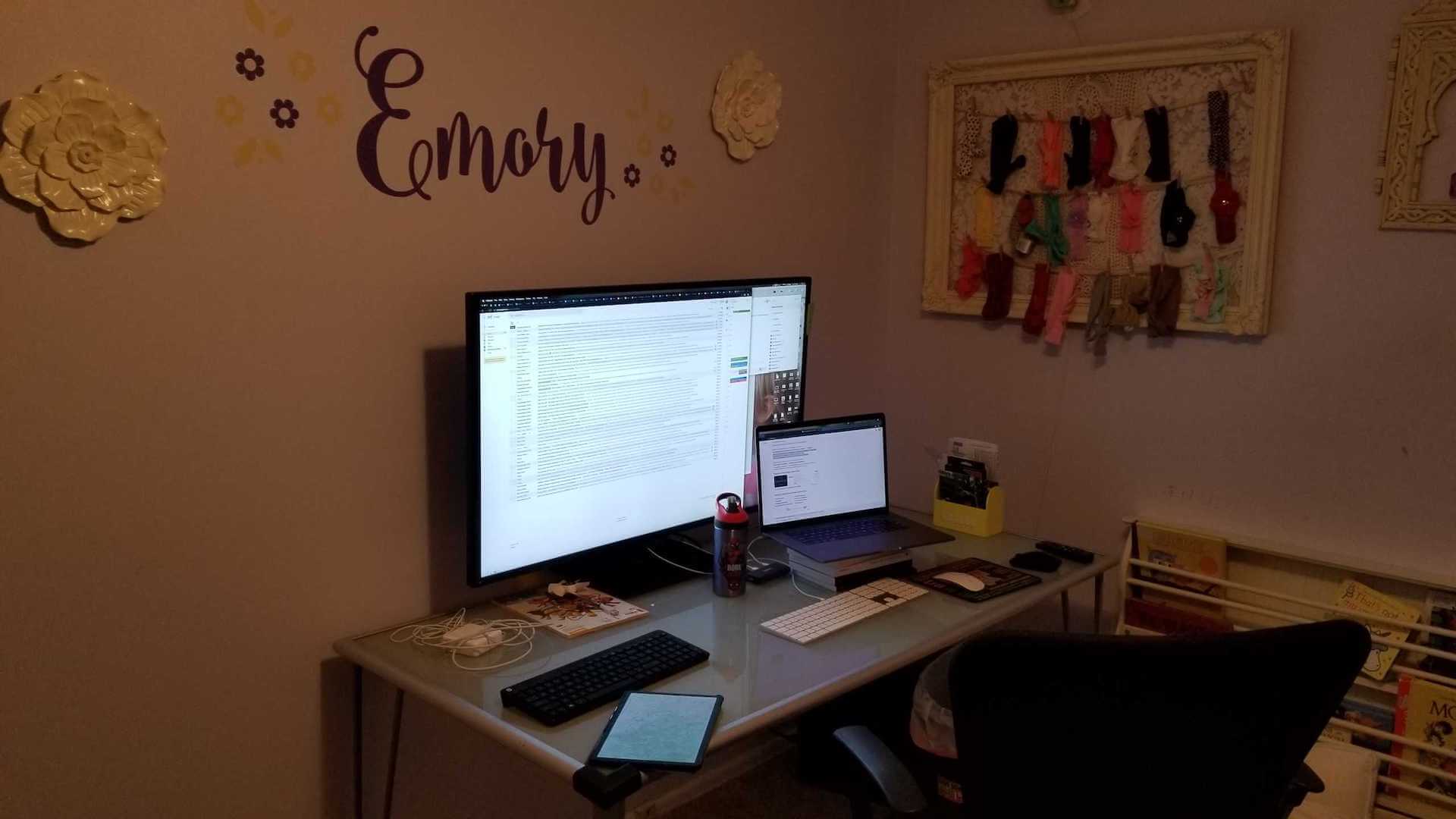
Senior Technical Product Manager Kevin has embraced his daughter Emory’s room as his work station, complete with wall decals and children’s books .
Further Embrace Servant Leadership
At DISQO, we strongly believe in Servant Leadership and we understand that it is a crucial part of having a healthy Agile organization. Servant leaders are servants first as opposed to leaders first. Servant leaders share power, put the needs of the employees first, and help people develop and perform as highly as possible.
To demonstrate the principle of Servant Leadership DISQO individual contributors are asked to manage up. This means that our individual contributors are able to comfortably tell their managers what they need from them. They also keep them in the loop of any deadlines attached to the requests. We can do this in real-time via Slack or use 15Five, our weekly check-in system, to bring our managers into our work. Especially now, it’s more important than ever to talk about challenges we have at home. This includes letting our managers know if we need additional equipment like monitors that will help us to do our jobs better.
This time in our lives is going to make history books, and we’re making the best of it. All of us are putting more effort into communication and adapting to this new “normal”. We understand that we’re going to be through this best by supporting one another and prioritizing our relationships.